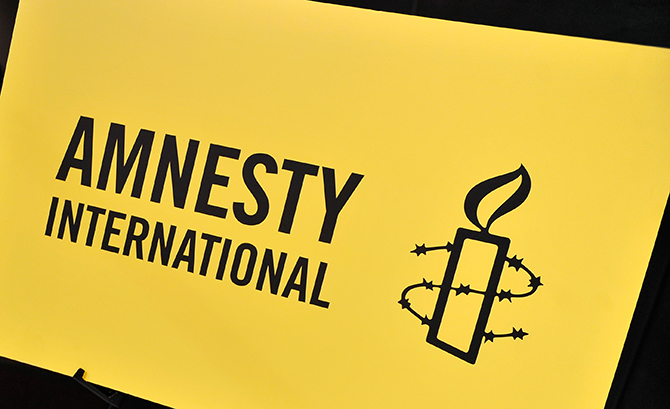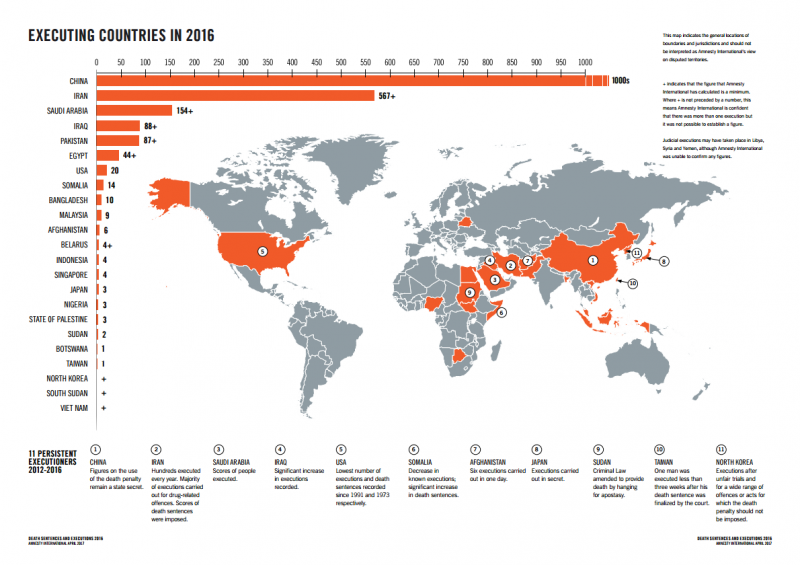At least 1,032 people executed in 23 countries in 2016, Amnesty International Annual Report says
At least 1,032 people were executed in 23 countries in 2016. In 2015 Amnesty International recorded 1,634 executions in 25 countries worldwide - a historical spike unmatched since 1989.
Most executions took place in China, Iran, Saudi Arabia, Iraq and Pakistan – in that order.
China remained the world’s top executioner – but the true extent of the use of the death penalty in China is unknown as this data is considered a state secret; the global figure of at least 1,032 excludes the thousands of executions believed to have been carried out in China.
Excluding China, 87% of all executions took place in just four countries – Iran, Saudi Arabia, Iraq and Pakistan.
For the first time since 2006, the USA was not one of the five biggest executioners, falling to seventh behind Egypt. The 20 executions in the USA was the lowest in the country since 1991.
During 2016, 23 countries, about one in eight of all countries worldwide, are known to have carried out executions. This number has decreased significantly from twenty years ago (40 countries carried out executions in 1997). Belarus, Botswana, Nigeria and authorities within the State of Palestine resumed executions in 2016; Chad, India, Jordan, Oman and United Arab Emirates –all countries that executed people in 2015 − did not report any executions last year.
141 countries worldwide, more than two-thirds, are abolitionist in law or practice.
In 2016, two countries – Benin and Nauru– abolished the death penalty in law for all crimes. In total, 104 countries have done so – a majority of the world’s states. Only 64 countries were fully abolitionist in 1997.
Commutations or pardons of death sentences were recorded in 28 countries in 2016. At least 60 people who had been sentenced to death were exonerated in 9 countries in 2016: Bangladesh (4), China (5), Ghana (1), Kuwait (5), Mauritania (1), Nigeria (32), Sudan (9), Taiwan (1) and Viet Nam (2).
Amnesty International recorded 3,117 death sentences in 55 countries in 2016, a significant increase on the total for 2015 (1,998 sentences in 61 countries). Significant increases were recorded in 12 countries, but for some, such as Thailand, the increase is due to the fact that the authorities provided Amnesty International with detailed information.
At least 18,848 people were on death row at the end of 2016. The following methods of execution were used across the world: beheading, hanging, lethal injection and shooting. Public executions were carried out in Iran (at least 33) and North Korea.
Reports indicated that at least two people who were under 18 at the time of the crime for which they were sentenced to death were executed in 2016 in Iran.
In many countries where people were sentenced to death or executed, the proceedings did not meet international fair trial standards. In some cases this included the extraction of “confessions” through torture or other ill-treatment, including in Bahrain, China, Iran, Iraq, North Korea and Saudi Arabia.
In Europe and Central Asia, Belarus resumed executions after a 17-month hiatus. Belarus and Kazakhstan are the only two countries in the region to use the death penalty.
Kazakhstan continued to observe the official moratorium on executions in place since 2003. A court in November 2016 sentenced to death Ruslan Kulekbayev, charged with terrorismrelated offences after the killing of 10 people in July.
Courts in Belarus imposed four death sentences. At least four people were executed during the year.
Syarhei Ivanou was executed in April, the first person known to have been executed in Belarus since November 2014. He was sentenced to death in 2015 for murder, theft and robbery committed in 2013. His brother had petitioned the UN Human Rights Committee, arguing that Syarhei Ivanou’s trial was unfair. The Committee had requested the Belarusian authorities not to carry out the execution while the case was under consideration.
Syarhei Ivanou’s execution was followed by those of Hyanadz Yakavitski, Syarhei Khmialeuski and Ivan Kulesh in November.
In January, the Minsk Regional Court found Hyanadz Yakavitski guilty of a murder committed in 2015. Hyanadz Yakavitski denied the charges against him and lodged an appeal against his conviction and death sentence with the Supreme Court and an appeal for clemency to the President. His defence lawyers maintained that vital evidence was omitted at his trial.
Syarhei Khmialeuski was sentenced to death in February for theft and murder. The UN Human Rights Committee had requested the Belarusian authorities not to carry out the execution pending the examination of his case.
Ivan Kulesh was sentenced to death in 2015 for murder, theft and robbery. His sentence was upheld in March 2016. Syarhei Vostryakau and Kiryl Kazachok are the last people known to be on death row in Belarus.
Syarhei Vostryakau was sentenced to death in May, having been found guilty of two separate cases of rape and murder. Kiryl Kazachok was sentenced to death in December for killing two of his children in January.



















